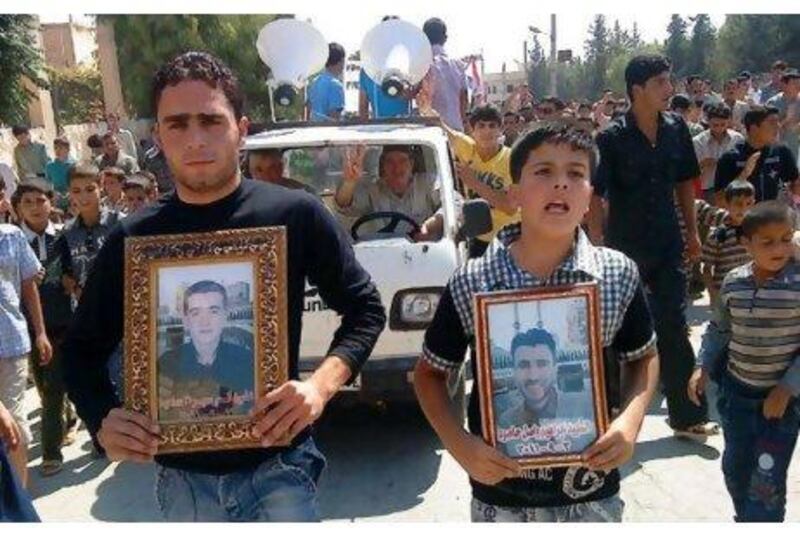DAMASCUS // Russia's efforts to broker a solution to the six-month crisis in Syria fell short yesterday with the opposition saying negotiations had reached a "dead end".
Moscow officials met opposition figures as thousands of anti-regime protesters took to the streets for another round of demonstrations.
At least five people were killed, activists said, including a teenage boy shot at a checkpoint near the northern village of Jabal Al Zawiyah. It is the scene of recent deadly security operations targeting protesters and, dissidents said, defecting soldiers.
Activists said security forces deployed in Damascus suburbs made a series of arrests as demonstrators prepared to march.
In the northern city of Qamishli, a largely Kurdish area, protesters claimed 25,000 took part in a rally.
"We want international protection," demonstrators shouted in cities across the country, videos posted online by activists showed.
In Moscow, Mikhail Margelov, the Russian presidential envoy to the Middle East, met Syrian opposition figures, including leading campaigner Ammar Qurabi.
Mr Qurabi, head of the National Organisation for Human Rights in Syria, said the chances of a dialogue were slim despite efforts by the opposition to reach out to the president, Bashar Al Assad.
"Syrian authorities answer only with bloodshed and the situation has reached a dead end," he said after the meeting.
Despite Mr Qurabi's pessimism, Mr Margelov said the option of talks had to be explored further.
"It is important to understand how a rapprochement could take place between the authorities and the opposition, what possibility there is for dialogue, and whether the people of Syria are ready for this dialogue," Mr Margelov said.
He is due to meet an adviser to Mr Al Assad next week as part of Moscow's mediation efforts. Mr Al Assad insists that reforms and a process of national dialogue are already underway - but opposition figures have said this cannot take place while protesters are being killed.
Government-backed committees are to meet tomorrow to discuss "the visions and ideas to reach a unified form for building modern Syria on the basis of democracy and pluralism", according to Sana, the official news agency.
Dissidents say talks can only take place if the regime halts deadly security operations against protesters, frees thousands of political prisoners and sets out an unambiguous timetable for reforms.
"The onus is on President Assad to accept the transition to democracy and prove his good faith, not the demonstrators," said Hussein Amach, a former Syrian government official now involved in a democratic initiative by ex-Baath party members and government ministers seeking regime change.
"Assad must face up to the reality of the situation and show he accepts the transition to democracy by clearly announcing there will be presidential elections in 2014, and by immediately surrendering some of his powers to a transitional government including opposition members," Mr Amach said.
No such proposals have been made by the authorities, although elections for Syria's parliament have been pencilled in for February.
"There is no credibility left in the word of this regime and it must prove its sincerity by actions," Mr Amach said. "There must be real steps on the ground that will restore trust, including an end to military operations."
The Russian president, Dmitry Medvedev, yesterday indicated that Moscow was ready to back a UN Security Council resolution on Syria, designed to encourage talks between the regime and opposition.
"We are ready to support different approaches but they must not be based on one-sided condemnations of the actions ... of the government and President Assad," Mr Medvedev said.
Russia, a key ally of Damascus, has provided vital diplomatic cover on the international stage, blocking efforts for UN resolutions being pushed by western nations.
Mr Medvedev, who had previously warned his Syrian counterpart to reform or risk being swept away, sharpened his criticism of Syria's "disproportionate use of force and the large number of victims" in trying to suppress the uprising.
More than 2,200 civilians have been killed since March, according to the UN, some by summary execution and through torture by the security forces. Syrian authorities say 600 security officials have been killed by "armed groups".
"Those who air anti-government slogans are not simply supporters of refined European democracy, said Mr Medvedev. "Some of them, frankly, are extremists, some could even be called terrorists."
The Arab League chief, Nabil Al Arabi, was to arrive in Damascus today with a proposal aimed at steering Syria out of its protracted crisis. His trip had previously been postponed for undisclosed reasons.
Leaked Arab League documents suggest Mr Al Arabi will call for a halt to a security crackdown, for the release of protesters and urge the Syrian leader to allow a contested presidential election in 2014, when his term of office expires.





